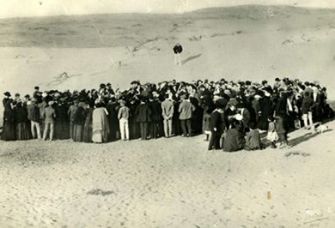 Żydzi, mniejszość, która irytuje
Żydzi, mniejszość, która irytuje
Fred Maroun
tłumaczenie: Małgorzata Koraszewska
 Tel Aviv, którego narodziny datuje się na 11 kwietnia 1909, kiedy grupa Żydów zebrała się na wydmach na północ od Jaffy planując na nabytych działkach budowę miasta.
Tel Aviv, którego narodziny datuje się na 11 kwietnia 1909, kiedy grupa Żydów zebrała się na wydmach na północ od Jaffy planując na nabytych działkach budowę miasta.
Żydzi są znienawidzoną mniejszością. Zawsze byli. Nienawidzono ich dłużej niż jakąkolwiek inną mniejszość, bardziej powszechnie i zazwyczaj z większą intensywnością. Dlaczego tak jest?
Co jest w Żydach, co tak bardzo ludzi denerwuje?
Nie ma niczego szczególnie wyjątkowego w Żydach. Żydzi nie są jednolitą mniejszością. Nie wszyscy wyglądają tak samo. Nie wszyscy ubierają się tak samo. Trudno ich zidentyfikować. Niemożliwe jest ustalenie ich opinii, choć wielu próbowało. Obwiniano ich o kapitalizm, komunizm i wszystko co znajduje się pomiędzy tymi dwoma biegunami.
Tym, co najbardziej irytuje świat, jest fakt, że Żydzi są mniejszością, która nie zachowuje się jak mniejszość.
W odróżnieniu od innych mniejszości, czy to przeciwstawiając się Imperium Rzymskiemu dwa tysiące lat temu, czy przeciwstawiając się Organizacji Narodów Zjednoczonych dzisiaj, Żydzi odmawiają pokornego milczenia, dostosowania się i stania się niewidzialnymi. Tworzą armie, wchodzą do elitarnych zawodów, są właścicielami przedsiębiorstw, handlują, tworzą związki zawodowe, przemawiają, rewolucjonizują naukę, rewolucjonizują gospodarki i obalają rządy. Są i irytują jak diabli.
Nawet po tym, jak wymordowano niemal połowę z nich, Żydzi nie wtopili się w tło. Ich pęd do zbudowania świątyni w Jerozolimie po raz trzeci stał się wyłącznie silniejszy, więc wskrzesili to, co francuski dyplomata nazwał w 2001 r. “tym gównianym, małym krajem, Izraelem”.
Mały, oczywiście, ale gówniany? Nie sądzę. Chyba, że przez gówniany rozumiał on niewiarygodnie mocny, zdumiewająco odporny i odnoszący niebywałe sukcesy. Wszystko, czego nikt nie spodziewa się ze strony mniejszości.
Także po tym, jak odzyskali swoje państwo, także po tym, jak wskrzesili język hebrajski, Żydzi nadal nie odpuszczają. Nadal nie akceptują w milczeniu agresji. Nadal nie akceptują sytuacji, kiedy mówi się im, co mają robić.
Odmawiają wręczenia państwa Palestyńczykom, jak tego żąda świat. Twierdzą uparcie, że Palestyńczycy w rzeczywistości nie chcą swojego państwa na Zachodnim Brzegu i nie zatrzymają się aż zniszczą Izrael. Twierdzą uparcie, że Izraela nie stać na oddanie za darmo ani centymetra, jeśli chce przeżyć w tym sąsiedztwie. Twierdzą uparcie, że Żydzi mają długą historię w Judei i Samarii (nazwanej przez Jordańczyków Zachodnim Brzegiem) i dlatego mogą tam być, jeśli tego chcą. Twierdzą uparcie, że jakoś sobie poradzą mimo demografii, mimo BDS i mimo opinii świata, bo wszystko to już widzieli w przeszłości i nie dbają dłużej o udobruchanie swoich wrogów.
Upierają się, upierają się i upierają się. Nie tego oczekuje się od miłej mniejszości.
Dla tych, których irytują Żydzi, a więc właściwie dla wszystkich, Izrael jest najgorszym wrzodem na tyłku. Żydzi nie tylko nie zanikli, ale mają teraz własne państwo, gdzie rządzą i zachowują się jak większość, pewna siebie większość.
Wiceprezydent i były premier Iraku, Nuri al-Maliki, powiedział Kurdom, którzy sięgają po niepodległość: „Nie pozwolimy na stworzenie drugiego Izraela”. Innymi słowy, zachowujcie się jak dobra, mała mniejszość i zamknijcie się!
Nic nie zadziałało przeciwko Żydom, by zmusić ich do podporządkowania się. Nie zadziałały wojny. Nie zadziałały pogromy. Nie zadziałała marginalizacja. Nie zadziałała asymilacja. A dzisiaj nie działają także bojkoty i demonizacja.
Wrogowie Żydów użyli nawet przeciwko nim ostatecznej broni – twierdzenia, że Żydzi zachowują się wobec Palestyńczyków w ten sam sposób, w jaki oprawcy Żydów zachowywali się wobec Żydów. Miało to nie tylko zdyskredytować Żydów w oczach świata, ale także zmusić ich do zwątpienia w siebie i do nienawiści do samych siebie. Chociaż dało się na to nabrać kilku Żydów, ta strategia jest jawną hipokryzją. Jest oczywiste, że Palestyńczycy sami przygotowali sobie swoje madejowe łoże z pomocą ich arabskich przyjaciół. Więc ta strategia także zawodzi.
Niewiele jest spraw, co do których Żydzi zgadzają się między sobą, także w sprawie Izraela i z pewnością w sprawie religii. Mają tylko jedną rzecz wspólną: bycie Żydami. Jakoś jednak przez lata, dziesięciolecia, stulecia i tysiąclecia pokazali upór, by przetrwać. I prawdopodobnie ten upór pozostanie im na zawsze.
Żydzi są mniejszością, która pokazuje większościom środkowy palec – ku zawiści innych mniejszości – i dlatego są nienawidzeni.
 Tel Awiw 2017.
Tel Awiw 2017.
 Fred Maroun
Fred Maroun
Pochodzący z Libanu Kanadyjczyk. Wyemigrował do Kanady w 1984 roku, po 10 latach wojny domowej. Jest działaczem na rzecz liberalizacji społeczeństw Bliskiego Wschodu. Prowadzi stronę internetową fredmaroun.blogspot.com
twoje uwagi, linki, wlasne artykuly, lub wiadomosci przeslij do: webmaster@reunion68.com




